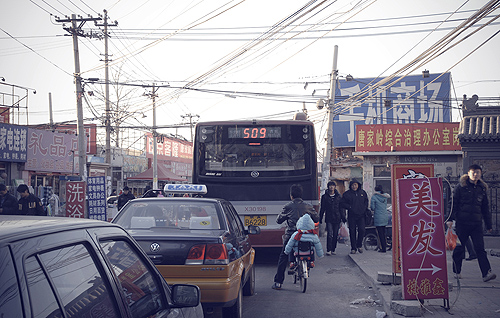|
 |
|
HARDSHIP VILLAGE: Tangjialing, a village 20 km northwest of Tiananmen Square, Beijing, receives public attention after the book Ants' Tribe was published in November (JING XIAOLEI) |
The village of Tangjialing, 20 km north of down town Beijing, was thrust into the public consciousness in November. Publishers that month released a book titled Ants' Tribe, which revealed that the poor rural suburb has become home to a community of young college graduates who have been forced to live there because of their low incomes and the high cost of living in Beijing.
"We strove to embrace city life and get rid of the backward countryside where we come from, but we ended up in the countryside anyhow," said a 23-year-old originally from Hebei Province surnamed Bai who now lives in Tangjialing. "I don't mind being labeled an ant in a colony, as I'm sure that one day I will get out of this ghetto-like village."
Bai is one of thousands of low-income college graduates who stay in big cities to pursue their dreams, a demographic group that sociologist likens to ants—intelligent and gregarious, weak in power but strong in spirit.
Bai came to Beijing after graduation in June 2009. She majored in gardening and got a job at a small real estate company in Beijing's Zhongguancun area, which is known as China's Silicon Valley and is a center for migrants who arrive there from all over China.
She is fond of clothing and good food but her salary prohibited her from buying those things. To make matters worse, average rental fees around her workplace are above what she can afford.
"I didn't want half of my monthly income to go to cover rent, so I had to live in a more remote place. My friends recommended Tangjialing to me," she said. "The first time I set foot in the village, I thought it was not much different from the place where I come from. But the village is more crowded and has more self-built shacks, which look very thin and unstable."
She was disappointed but endured the blow. She soon learned that the village is home to 3,000 locals and over 50,000 outsiders, most college graduates like her, along with a smattering of students and migrant workers.
She shared a room with two other women for about 300 yuan ($49) a month. They shared a bathroom with other tenants and there were neither air conditioners nor heaters in the rooms, which also had thin walls. She was often disturbed to overhear next-door neighbors playing music and laughing loudly.
Her patience and endurance wore out as time passed. She decided that she needed to move and posted a notice on a community Internet forum to find roommates for another place close to a subway station.
Uncompromising
Ants' Tribe is based on two years of interviews with about 600 low-income college graduates in Beijing, some 60 percent being college graduates from rural areas and smaller towns around China. Many are considered the best hope for their poor families to rise out of poverty. Sadly, some lost their jobs as a result of the 2008 financial crisis, but are unwilling to go home.
"I'm prepared for the hardship I'm going to encounter. Success doesn't come easy," Bai said. She is still optimistic about her future though she admits that life right now is far from satisfying.
Some residents of the "ants" community have not been happy with the attention brought by the book.
"We don't want special attention from the outside. Leave us alone so that we can keep a quiet and undisturbed life around here," said the head of Tangjialing's Internet community under an online pseudonym Dong Er.
A social phenomenon is forming around the book's reception among current college students. Cheng Xudong, a fourth-year student at a Shaanxi Province university created a website dedicated to the community of the struggling graduates.
"Though I'm still in school, I'm afraid I could become part of the tribe in the future. I started a site to help 'ants' communicate with and help each other," said Cheng.
In Beijing, there are several communities other than Tangjialing, including Shahezhen and Xiaoyuehe. Similar places can also be found in other large cities, such as Shanghai.
In September, the Ministry of Human Resources and Social Security said that 74 percent of the 6.11 million new graduates of China's universities and colleges had been employed by September 1.
Lian Si, editor of Ants' Tribe and a professor at Beijing's University of International Business and Economics, said statistics say very little about the real situation for many of these graduates.
"I am always wondering how many employed college graduates are leading a decent life," Lian said. "I hope this book can offer a window into the world of these young people, whose stories are rarely known."
The problem has caused warning bells around the country's higher education situation. Tang Jun, a former CEO of Microsoft China and a successful businessman, said the country needs to pay closer attention to the reality of the lives of college students rather than employment figures. | 